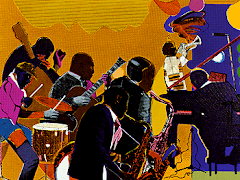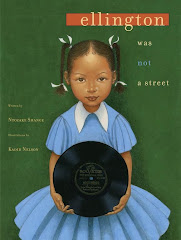


After Gandhi; One Hundred Years of Nonviolent Resistance
By Anne Sibley O’Brien and Perry O’Brien
Published by Charlesbridge www.charlesbridge.com
©2009
Reviewed by Sojourner Ahebee
Have you ever had one of those moments when you heard a name in the news that most people weren't familiar with, but you were-you the kid? Aung San Suu Kyi has been headlining the news for a few weeks now. I feel so proud that I know who she is and what she stands for and I knew about her long before these recent events. My knowledge of Aung San Suu Kyi and of the many committed people like her is due to this wonderful book called After Gandhi; One Hundred Years of Nonviolent Resistance by Anne Sibley O’Brien and Perry Edmond O’Brien.
By Anne Sibley O’Brien and Perry O’Brien
Published by Charlesbridge www.charlesbridge.com
©2009
Reviewed by Sojourner Ahebee
Have you ever had one of those moments when you heard a name in the news that most people weren't familiar with, but you were-you the kid? Aung San Suu Kyi has been headlining the news for a few weeks now. I feel so proud that I know who she is and what she stands for and I knew about her long before these recent events. My knowledge of Aung San Suu Kyi and of the many committed people like her is due to this wonderful book called After Gandhi; One Hundred Years of Nonviolent Resistance by Anne Sibley O’Brien and Perry Edmond O’Brien.
This book, published this year by Charlesbridge, features 16 amazing people from around the world, who chose a nonviolent means of resistance to express their discontent with injustice and oppression. Aung San Suu Kyi of (Burma) Myanmar, despite house arrest, years of separation from her family, has continually challenged, through peaceful resistance, the Myanmar government to be fair and just. She won the Nobel Prize for Peace in 1991. In After Gandhi; One Hundred Years of Nonviolent Resistance, the reader learns about Aung San Suu Kyi’s life, her father’s political activism and his death, her years of campaigning for democracy in her country and her years under house arrest.
Click this link to see Aung San Suu Kyi and hear her and to learn of recent events concerning her.
http://www.guardian.co.uk/world/2009/may/14/suu-kyi-lake-swim-yettaw
After Gandhi; One Hundred Years of Nonviolent Resistance makes the reader, especially the teen reader, care about the people being profiled. The book presents the political struggles, of these people, in way that is understandable and interesting. The fact that many of the featured activists are alive and actively fighting to make this world a better place is a great example for young people to admire and emulate.
http://www.guardian.co.uk/world/2009/may/14/suu-kyi-lake-swim-yettaw
After Gandhi; One Hundred Years of Nonviolent Resistance makes the reader, especially the teen reader, care about the people being profiled. The book presents the political struggles, of these people, in way that is understandable and interesting. The fact that many of the featured activists are alive and actively fighting to make this world a better place is a great example for young people to admire and emulate.
Being a girl originally from Africa-Cote d’Ivoire-, I am now, because of this book, a huge fan of Wangari Maathai, the Tree Lady. She is a Kenyan woman who is a fearless environmentalist. She saw the link earlier on between poverty and the destruction of Kenya’s environment. In response, she organized Kenyan women to plant trees to stop deforestation. Trees prevent soil from washing away and allow people to plant crops to meet their needs. This movement of planting trees is called the Green Belt Movement. To date, Wangari Maathai and her women have planted more than 40 million trees in Kenya. The Kenyan government began to fear her and how effectively she was organizing women to empower themselves. She was arrested and even beaten. But her resistance and that of her followers have always been nonviolent- hunger strikes, marches, etc. In 2004, Wangari Maathai won a Nobel Prize for Peace. She stated:
“ We are called to assist the Earth to heal her wounds and in the process heal our own…”
I first saw Muhammad Ali on Dancing with the Stars. He was in the audience to support his daughter, who was one of the dancers. I remember expressing more awe for his daughter than for him. But, my mother and grandfather told me that it was Muhammad Ali who deserved my admiration. To be honest, their comments didn’t really sink in, but reading about Muhammad Ali, in After Gandhi; One Hundred Years of Nonviolent Resistance , I know why they were so passionate in their respect for him. Muhammad Ali was one of the great boxers of all-time. He had not only physical skill, but he was intelligent ,articulate, and committed to what was right. He stood a stand against the Vietnam War at an important time in his career. He lost his boxing license and commercial contracts worth millions of dollars. He stayed true to his convictions. Eventually, he returned to boxing and became its biggest star. I like this quote by Muhammad Ali:
"Why should they ask me to put on a uniform and go ten thousand miles from home and drop bombs and bullets on brown people while so-called Negro people in Louisville are treated like dogs and denied simple human rights?"
These are just three incredible people featured in the book; a book that needs to be a part of every young person’s library. Learn about Desmond Tutu of South Africa, the student activists of China, Cesar Chavez of the United States, Charles Perkins of Australia and many more committed people.
Again, here is the website for Charlesbridge www.charlesbridge.com. They publish amazing books that connect you to the rest of the world. I am presently reading The Camel Rider and will do a review of this book next.
Here is a site full of fun coloring pages of people from around the world who want and are making our world a better place.
“ We are called to assist the Earth to heal her wounds and in the process heal our own…”
I first saw Muhammad Ali on Dancing with the Stars. He was in the audience to support his daughter, who was one of the dancers. I remember expressing more awe for his daughter than for him. But, my mother and grandfather told me that it was Muhammad Ali who deserved my admiration. To be honest, their comments didn’t really sink in, but reading about Muhammad Ali, in After Gandhi; One Hundred Years of Nonviolent Resistance , I know why they were so passionate in their respect for him. Muhammad Ali was one of the great boxers of all-time. He had not only physical skill, but he was intelligent ,articulate, and committed to what was right. He stood a stand against the Vietnam War at an important time in his career. He lost his boxing license and commercial contracts worth millions of dollars. He stayed true to his convictions. Eventually, he returned to boxing and became its biggest star. I like this quote by Muhammad Ali:
"Why should they ask me to put on a uniform and go ten thousand miles from home and drop bombs and bullets on brown people while so-called Negro people in Louisville are treated like dogs and denied simple human rights?"
These are just three incredible people featured in the book; a book that needs to be a part of every young person’s library. Learn about Desmond Tutu of South Africa, the student activists of China, Cesar Chavez of the United States, Charles Perkins of Australia and many more committed people.
Again, here is the website for Charlesbridge www.charlesbridge.com. They publish amazing books that connect you to the rest of the world. I am presently reading The Camel Rider and will do a review of this book next.
Here is a site full of fun coloring pages of people from around the world who want and are making our world a better place.
http://www.betterworldheroes.com/


























1 comment:
Hi, Sojourner,
My son Perry and I are thrilled by this wonderful review of our book, After Gandhi. Your response is exactly what we were hoping for when we wrote it: that readers would be amazed and inspired to learn of the courageous, creative acts of nonviolence by people all over the world.
I'm excited to discover your blog, and wanted to share mine with you as well: ColoringBetween.blogspot.com. Your wonderful entry about Cote d'Ivoire beautifully illustrates the issue that provoked me to begin my blog (see first entry): that Africa is not one place full of poverty, famine and war, but an enormous continent with astonishing diversity and richness. (You also make me want to visit Cote d'Ivoire!)
Thanks so much, and I'll be checking in on your blog from now on!
Annie
Post a Comment